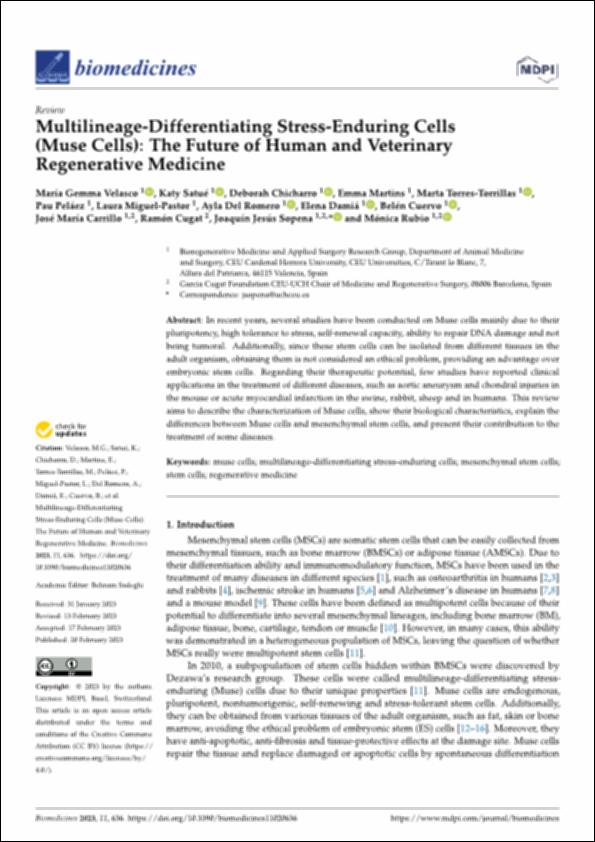Please use this identifier to cite or link to this item:
http://hdl.handle.net/10637/15266Multilineage-differentiating stress-enduring cells (Muse Cells): the future of human and veterinary regenerative medicine
| Title: | Multilineage-differentiating stress-enduring cells (Muse Cells): the future of human and veterinary regenerative medicine |
| Authors : | Velasco Martínez, María Gemma Satué Ambrojo, Katiuska Chicharro Alcántara, Deborah Martins, Emma Julie Camille Torres Torrillas, Marta Peláez Gorrea, Pau Miguel Pastor, Laura Romero Martínez, Ayla del Damiá Giménez, Elena Cuervo Serrato, Belén Carrillo Poveda, José María. Cugat Bertomeu, Ramón Sopena Juncosa, Joaquín Jesús. Rubio Zaragoza, Mónica. |
| Keywords: | Célula; Cells; Células madre; Stem cells; Terapia; Therapy |
| Publisher: | MDPI |
| Citation: | Velasco, M.G., Satué, K., Chicharro, D., Martins, E., Torres-Torrillas, M., Peláez, P., Miguel-Pastor, L., Del Romero, A., Damiá, E., Cuervo, B., Carrillo, J.M., Cugat, R., Sopena, J.J. & Rubio, M. (2023). Multilineage-differentiating stress-enduring cells (Muse Cells): the future of human and veterinary regenerative medicine. Biomedicines, vol. 11, i. 2, art. 636 (20 feb.). DOI: https://doi.org/10.3390/biomedicines11020636 |
| Abstract: | In recent years, several studies have been conducted on Muse cells mainly due to their pluripotency, high tolerance to stress, self-renewal capacity, ability to repair DNA damage and not being tumoral. Additionally, since these stem cells can be isolated from different tissues in the adult organism, obtaining them is not considered an ethical problem, providing an advantage over embryonic stem cells. Regarding their therapeutic potential, few studies have reported clinical applications in the treatment of different diseases, such as aortic aneurysm and chondral injuries in the mouse or acute myocardial infarction in the swine, rabbit, sheep and in humans. This review aims to describe the characterization of Muse cells, show their biological characteristics, explain the differences between Muse cells and mesenchymal stem cells, and present their contribution to the treatment of some diseases. |
| URI: | http://hdl.handle.net/10637/15266 |
| Rights : | Open Access http://creativecommons.org/licenses/by/4.0/deed.es |
| ISSN: | 2227-9059 (Electrónico) |
| Issue Date: | 20-Feb-2023 |
| Center : | Universidad Cardenal Herrera-CEU |
| Appears in Collections: | Dpto. Medicina y Cirugía Animal |
Items in DSpace are protected by copyright, with all rights reserved, unless otherwise indicated.


